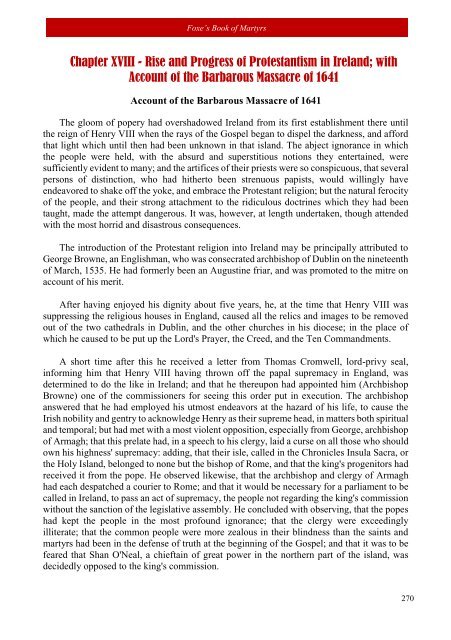Foxe - The Book of Martyrs
The mystery of history is not completely dark, since it is a veil which only partially conceals the creative activity and spiritual forces and the operation of spiritual laws. It is commonplace to say that the blood of the martyrs is the seed of the Church yet what we are asserting is simply that individual acts of spiritual decision bear social fruit …For the great cultural changes and historic revolutions that decide the fate of nations or the character of an age is the cumulative result of a number of spiritual decisions … the faith and insight, or the refusal and blindness, of individuals. No one can put his finger on the ultimate spiritual act that tilts the balance, and makes the external order of society assume a new form… Persecution, powerless to destroy or even to shake this new community, made it only the more sensible of its own strength, and pressed it into a more compact body.
The mystery of history is not completely dark, since it is a veil which only partially conceals the creative activity and spiritual forces and the operation of spiritual laws. It is commonplace to say that the blood of the martyrs is the seed of the Church yet what we are asserting is simply that individual acts of spiritual decision bear social fruit …For the great cultural changes and historic revolutions that decide the fate of nations or the character of an age is the cumulative result of a number of spiritual decisions … the faith and insight, or the refusal and blindness, of individuals. No one can put his finger on the ultimate spiritual act that tilts the balance, and makes the external order of society assume a new form… Persecution, powerless to destroy or even to shake this new community, made it only the more sensible of its own strength, and pressed it into a more compact body.
Create successful ePaper yourself
Turn your PDF publications into a flip-book with our unique Google optimized e-Paper software.
<strong>Foxe</strong>’s <strong>Book</strong> <strong>of</strong> <strong>Martyrs</strong><br />
Chapter XVIII - Rise and Progress <strong>of</strong> Protestantism in Ireland; with<br />
Account <strong>of</strong> the Barbarous Massacre <strong>of</strong> 1641<br />
Account <strong>of</strong> the Barbarous Massacre <strong>of</strong> 1641<br />
<strong>The</strong> gloom <strong>of</strong> popery had overshadowed Ireland from its first establishment there until<br />
the reign <strong>of</strong> Henry VIII when the rays <strong>of</strong> the Gospel began to dispel the darkness, and afford<br />
that light which until then had been unknown in that island. <strong>The</strong> abject ignorance in which<br />
the people were held, with the absurd and superstitious notions they entertained, were<br />
sufficiently evident to many; and the artifices <strong>of</strong> their priests were so conspicuous, that several<br />
persons <strong>of</strong> distinction, who had hitherto been strenuous papists, would willingly have<br />
endeavored to shake <strong>of</strong>f the yoke, and embrace the Protestant religion; but the natural ferocity<br />
<strong>of</strong> the people, and their strong attachment to the ridiculous doctrines which they had been<br />
taught, made the attempt dangerous. It was, however, at length undertaken, though attended<br />
with the most horrid and disastrous consequences.<br />
<strong>The</strong> introduction <strong>of</strong> the Protestant religion into Ireland may be principally attributed to<br />
George Browne, an Englishman, who was consecrated archbishop <strong>of</strong> Dublin on the nineteenth<br />
<strong>of</strong> March, 1535. He had formerly been an Augustine friar, and was promoted to the mitre on<br />
account <strong>of</strong> his merit.<br />
After having enjoyed his dignity about five years, he, at the time that Henry VIII was<br />
suppressing the religious houses in England, caused all the relics and images to be removed<br />
out <strong>of</strong> the two cathedrals in Dublin, and the other churches in his diocese; in the place <strong>of</strong><br />
which he caused to be put up the Lord's Prayer, the Creed, and the Ten Commandments.<br />
A short time after this he received a letter from Thomas Cromwell, lord-privy seal,<br />
informing him that Henry VIII having thrown <strong>of</strong>f the papal supremacy in England, was<br />
determined to do the like in Ireland; and that he thereupon had appointed him (Archbishop<br />
Browne) one <strong>of</strong> the commissioners for seeing this order put in execution. <strong>The</strong> archbishop<br />
answered that he had employed his utmost endeavors at the hazard <strong>of</strong> his life, to cause the<br />
Irish nobility and gentry to acknowledge Henry as their supreme head, in matters both spiritual<br />
and temporal; but had met with a most violent opposition, especially from George, archbishop<br />
<strong>of</strong> Armagh; that this prelate had, in a speech to his clergy, laid a curse on all those who should<br />
own his highness' supremacy: adding, that their isle, called in the Chronicles Insula Sacra, or<br />
the Holy Island, belonged to none but the bishop <strong>of</strong> Rome, and that the king's progenitors had<br />
received it from the pope. He observed likewise, that the archbishop and clergy <strong>of</strong> Armagh<br />
had each despatched a courier to Rome; and that it would be necessary for a parliament to be<br />
called in Ireland, to pass an act <strong>of</strong> supremacy, the people not regarding the king's commission<br />
without the sanction <strong>of</strong> the legislative assembly. He concluded with observing, that the popes<br />
had kept the people in the most pr<strong>of</strong>ound ignorance; that the clergy were exceedingly<br />
illiterate; that the common people were more zealous in their blindness than the saints and<br />
martyrs had been in the defense <strong>of</strong> truth at the beginning <strong>of</strong> the Gospel; and that it was to be<br />
feared that Shan O'Neal, a chieftain <strong>of</strong> great power in the northern part <strong>of</strong> the island, was<br />
decidedly opposed to the king's commission.<br />
270


















